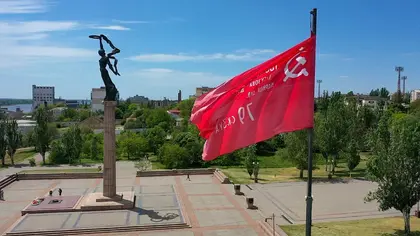Life today in the Russian–occupied city of Kherson in southern Ukraine resembles the regime described in George Orwell’s dystopian novel “1984”.
The only difference is that it is happening in reality. This is the story of one family that is living through that dystopian reality.
JOIN US ON TELEGRAM
Follow our coverage of the war on the @Kyivpost_official.
On March 2, Russian invaders took control of Kherson.
Oksana, her husband Ruslan, his mother and her two sons (aged six and 11) were unable to flee because her eldest son has a serious disease. All of them are still in the occupied city.
The lady told the Kyiv Post about the efforts made by Russian occupying authorities to subdue Ukrainians politically, economically and psychologically.
She confirmed they had not opened a single “green corridor” for evacuation in three months.
The family has been left without medication for the eldest son. “After the war began, we couldn’t get to doctors for a month,” says Oksana. “Our family doctor lives in a suburban community and it was completely blocked. After Russian troops occupied the entire city, they blocked all exits. There were roadblocks on every street. Everybody was afraid to go outside. There are no doctors in the city. Most of them left. There is nowhere to get medicines, as 90% of drugstores shut down or looted. Volunteers have no access to the city. It’s all very hard.”
Oksana recalls that in the first weeks, when it was impossible to get even the most essential things, including syringes, she had to make six injections using just one disposable syringe.
Before the war, Oksana’s husband was a taxi driver and she received monthly social security for her eldest son, and her mother-in-law received a pension. The family had no savings. Now her husband has no job. The eldest son, Bohdan, has a serious genetic locomotor disease and is oxygen-dependent. Before the war, charity funds and volunteers supplied him with food, medical equipment, medicines and disposables. They still try to support the family in every way they can.
Going out, Oksana and her family make sure they’re not carrying their cellphones. If any photo on a phone appears suspicious to Russian soldiers, they may beat up or detain the owner. Ordinary civilians simply disappear, And this happens every single day.
It is clear that danger is all around.
Oksana explains that anyone can be beaten up or even killed “for anything that looks or sounds Ukrainian, or because you look suspicious, or because someone squeals on you – yes, there are traitors here too.”
The family never even tried to leave, knowing that those who do leave have to wait several days on the road. That would kill Bohdan who is connected to a ventilator.
“I didn’t even try to leave. At first, we thought it would end soon, that we would be freed, that it wouldn’t be so horrible. Then, after we spent a week in the basement, the kids fell ill,” says Oksana.
Lots of people have fled Kherson, leaving it badly short of doctors, teachers and critical infrastructure workers.
As to the economic situation in Kherson, prices are three or four times higher there than on “the mainland”. The national currency, the hryvnia, is still accepted, but price tags in Russian supermarkets display two currencies and occupying authorities press residents to switch to the Russian ruble. Foodstuffs and essential medicines are in short supply. Ukrainian supermarkets and chain stores closed down back in April.
“There are no centralized supplies,” says Oksana. “Private dealers bring everything from Crimea and some factories that still operate in occupied cities like Melitopol [Zaporizhzhya Region] and nearby Kakhovka. In downtown Kherson, several big stores have opened in place of Ukrainian chain stores. All of their merchandise is delivered by lorries from Russia. One can buy everything, but we don’t, because we can’t afford it, so we just don’t care. We’re still holding out. The hryvnia is still accepted, but very many transactions are already in the Russian currency. There are two currencies on price tags in Russian stores. The new authorities are forcing people to use Russian money.”
The Russian occupying authorities are also inviting vulnerable groups in society like pensioners, people with disabilities and large families to submit their personal data to the so-called “ruble welfare register”.

They have announced that government-funded employees will receive their salaries in Russian currency. Because Ukrainian humanitarian aid never reaches Kherson, people queue up for meagre social payments in rubles. Arguments and fights in the lines are quite common.
Oksana rounds off our conversation by pondering bitterly: “All of us here keep wondering why was the city taken so quickly, why is it still occupied, how should we live here without being called traitors or collaborators, how should we survive at all? What should we do if they cut off telecommunications, as they have done many times before? How should we call an ambulance, or just tell someone without using the Russian operators, that we’re still alive?”
You can also highlight the text and press Ctrl + Enter




